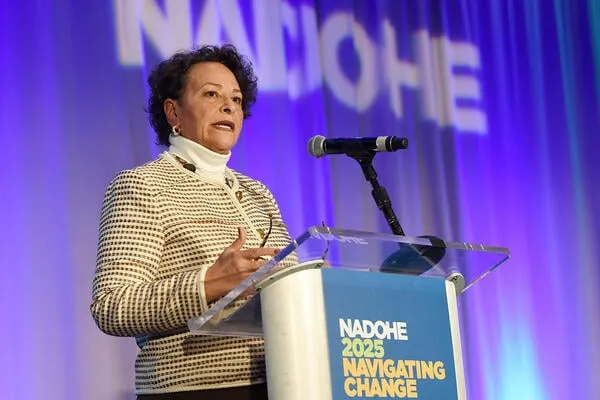A majority of students say they interned to gain skills for career advancement in their desired field or role.
Frazao Studio Latino/E+/Getty Images
Employers, college leaders and policymakers have shown growing interest in skills-based hiring for college graduates, and in considering students’ demonstrated learning rather than their major program or degree. This trend signals a need for more hands-on or experiential learning before a student graduates, rather than on-the-job training.
A recent report from Strada shows that students also see this gap; a majority of those surveyed opted to participate in work-based learning to prepare them for a chosen profession or improve their odds as a job candidate.
Report authors also note opportunities for institutions to enhance on-campus experiences to better equip students for the world of work, such as providing professional networking, soft skill development and mentorship.
State of play: Increasingly, employers are emphasizing skills learned in higher education over content, citing a need for students to be adaptable and responsive to the evolving workplace. The drive toward skills-based hiring also stems in part from degree inflation and a re-leveling of jobs that actually require postsecondary education.
For students, this means a smaller share of entry-level positions require a bachelor’s degree. But some employers still screen by demonstrated skills, such as those gained through internships, rather than grades.
Not every student is able to participate in an internship. A 2025 survey from Handshake found that 12 percent of students have not participated in an internship and do not expect to do so before they graduate. Barriers to participation include caregiving responsibilities, limited access to internship opportunities or needing to work for pay. A 2024 report from the Business-Higher Education Forum found that students of color, first-generation students and community college students were less likely than their peers to secure an internship.
The National Association of Colleges and Employers (NACE) published research in May pointing to the benefit of experiential learning for early career outcomes; students who engaged in work-based learning were more likely to say they had better-than-expected career progress, higher salaries and greater general career satisfaction, compared to their peers who lacked an internship.
Methodology
Strada’s National Survey of Work-based Learning includes 2,000 responses from seniors at four-year colleges and universities in the U.S. The study was fielded between October and December 2024.
The study: Strada’s survey found that 65 percent of students participate in work-based learning to gain experience or skills in a specific career or their chosen profession. This echoes Handshake’s survey from early this year, which found that 87 percent of students pursue internships to build valuable skills.
“Today’s students are much more likely to view their experiences as instrumental rather than exploratory,” according to the Strada report.
Thirteen percent said they selected work-based learning experiences as an exploration of work, and approximately 8 percent said their main purpose was to land a job at their host organization.
Students saw paid internships and undergraduate research as most valuable for improving their standing as candidates for future jobs. Practicums were also rated highly, which could include clinical experiences in the health professions or student-teaching roles. Unpaid internships, project-based learning, on-campus jobs and off-campus jobs were seen as less valuable.
Among students who participated in multiple experiential learning opportunities, 81 percent ranked their most valuable experience as at least a seven out of 10. One in four respondents gave that experience a 10 out of 10.
Students who rated their experiences highly were also more likely to say they expanded their professional networking as participants. Students who worked as paid interns or unpaid interns were most likely to say they expanded their professional network.
Practicum participants were most likely to say they gained technical skills relevant to their career goals, followed by project-based learning participants and paid interns. Those working on- or off-campus jobs were least likely to report technical skill development.
By comparison, interns were most likely to report learning broad skills, also called enduring or soft skills.
On- and off-campus job experiences were rated lowest among respondents for a variety of factors, including value added to their persona as a job applicant, increased technical or durable skills, professional networking and mentorship.
Role of higher ed: Past surveys have shown that students believe their institution has a role to play in giving them internship experience.
A winter 2023 survey from Inside Higher Ed and College Pulse found that 62 percent of students believe their career center should help them get an internship. A 2024 Student Voice survey found that 48 percent of respondents think their institution should focus on helping students find internships and jobs, and 38 percent believe colleges should focus more on helping students prepare for internship and career success.
Students say faculty should also help in this process; one in five Student Voice respondents indicated professors are at least partially responsible for helping students find internships.
Strada’s report includes recommendations for colleges and universities such as:
- Set a goal for each student to have at least one work-based learning experience while enrolled.
- Integrate more work-based learning into the classroom and on-campus jobs.
- Leverage employer feedback to create skill development opportunities in on-campus opportunities, such as courses and projects.
- Establish spaces to introduce students to employers or other professionals who can add to their professional network.
How does your college or university prepare students for the world of work? Tell us more.


